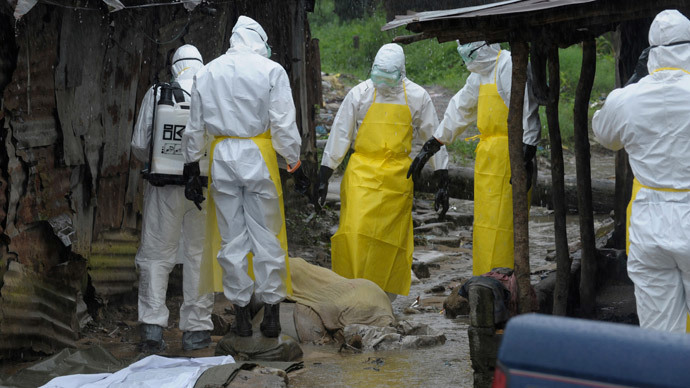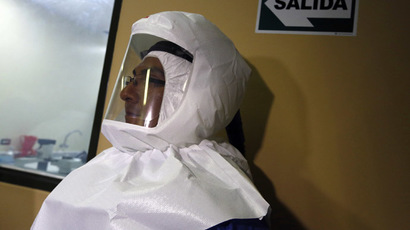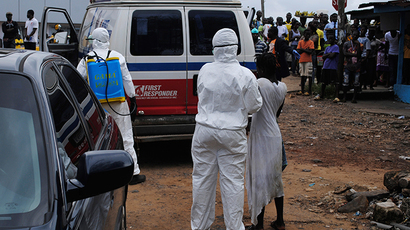Throats slit: Ebola health team, journalists brutally killed in Guinea

The bodies of eight people – including three journalists – were found in Guinea after an Ebola health team came under attack two days ago, officials said. Meanwhile, the UN plans to deploy a special mission to fight the virus in the worst-hit countries.
READ MORE: Stark warning: WHO says Ebola epidemic out of control, death toll over 2,400
The group, which included three doctors and three journalists, is
said to have been attacked near Nzerekore, a city near Guinea’s
southern tip. With the Ebola death toll now topping 2,600, the
team was sent to the area to help raise awareness about the
virus. They had been missing since Tuesday.
The six were found dead on Thursday. The identities of the other
two bodies are currently unknown.
Government spokesman Damantang Albert Camara told Reuters that
the workers and journalists were brutally beaten to death.
“The eight bodies were found in the village latrine. Three of
them had their throats slit,” he said.
Earlier this week, the team members met with locals. A resident
named Yves told the Guardian that there were no problems until
after that assembly took place.
“The meeting started off well; the traditional chiefs
welcomed the delegation with 10 kola nuts as a traditional
greeting,” Yves said. “It was afterwards that some
youths came out and started stoning them. They dragged some of
them away, and damaged their vehicles.”

The dangers of Ebola have been difficult to communicate in some
rural villages, where suspicion of health workers reigns. Last
month in Nzerekore, riots erupted when workers reportedly
“tried to spray the local market,” leading residents to
believe they were actually spreading the virus themselves.
As the virus continues to tear through West Africa, the UN
announced on Thursday that it is creating a special mission to
fight the disease in Liberia, Guinea, and Sierra Leone – the
three countries where the virus has done the worst damage. The
move came just as the UN Security Council called the outbreak
“a threat to international peace and security.”
Co-sponsored by 131 nations, the plan will involve mobilizing
money, personnel, and supplies to victims.
“This international mission...will have five priorities:
stopping the outbreak, treating the infected, ensuring essential
services, preserving stability and preventing further
outbreaks,” UN Secretary General Ban Ki-moon said to the
Security Council.
Other countries have also been stepping up aid to the region. The
United States announced on Tuesday that it is sending 3,000
troops to West Africa, and that it will build 17 new treatment
centers. France will install a military hospital in Guinea.
Britain, China, and Cuba have promised to send health workers to
the region.
Jackson Naimah, a health team leader in Liberia, told the
Security Council that more help is desperately needed.
“We are trying to treat as many people as we can, but there are
not nearly enough treatment centers and patient beds,” he
said, according to Reuters. “People are sitting at the gates
of our centers, literally begging for their lives. They rightly
feel alone, neglected, denied – left to die a horrible,
undignified death.”














